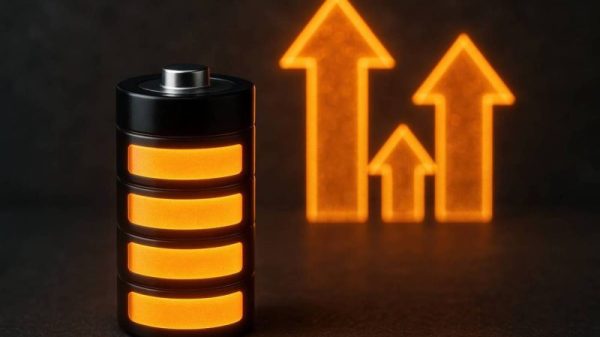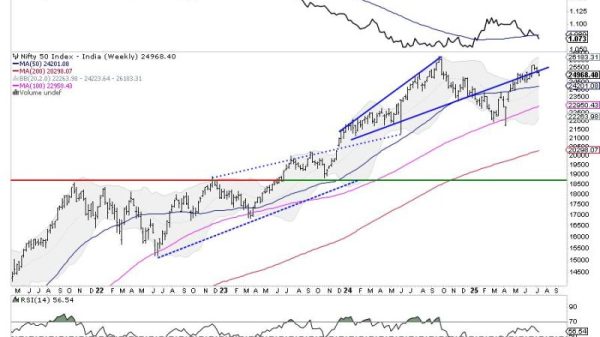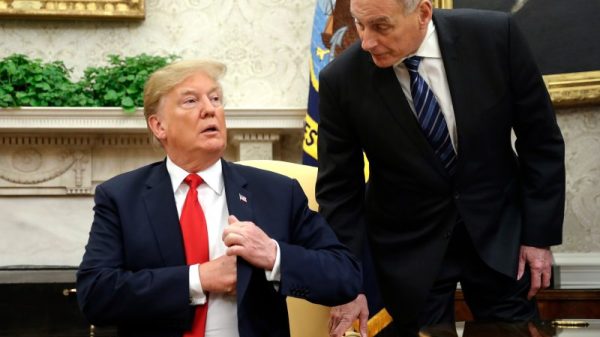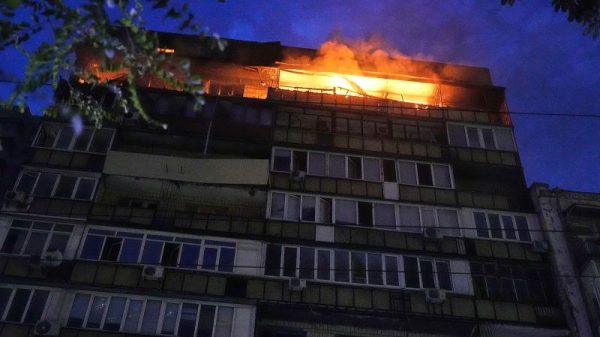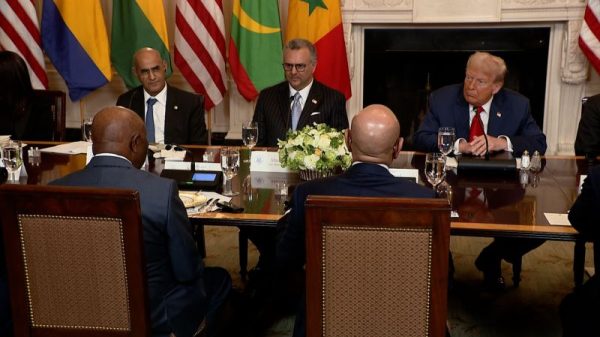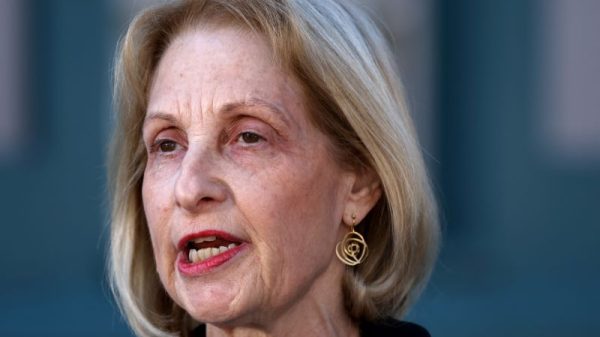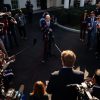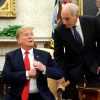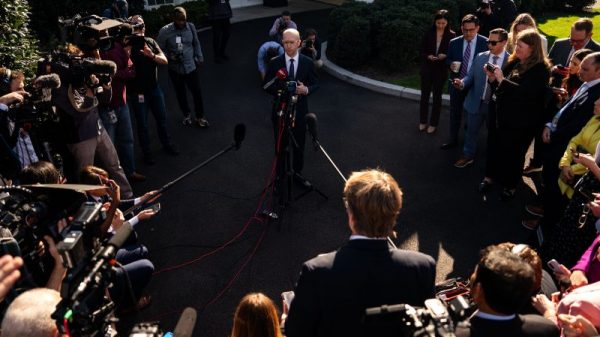At first, he would just talk about immigrants living in the country illegally.
Make him president again, Donald Trump told his audiences, and he would make sure that undocumented immigrants were uprooted and deported. When he ran in 2016, he focused mostly on those immigrants who were identified as criminals, an argument his running mate, Sen. JD Vance (R-Ohio), elevated during the vice-presidential debate earlier this month. But, in part because Trump constantly exaggerates the scale of the undocumented immigrant population, his 2024 pitch now centers on something much more sweeping, intentionally targeting and expelling theoretical tens of millions of people.
His idea is to cobble together an ad hoc group of enforcers tasked with sweeping the country for targets.
“We will send elite squads of ICE, border patrol, and federal law enforcement officers to hunt down, arrest, and deport every last illegal alien gang member, until there is not a single one left,” he explained in a recent social media post, referring to Immigration and Customs Enforcement and other agencies.
Described like that, it might look at a bit like the streets of D.C. in June 2020, when, in response to protests focused on the killing of George Floyd by police in Minnesota, the Trump administration pulled in enforcers from various parts of the government, some of whom intentionally stripped off any identifying insignia. These were the demonstrations that prompted Trump to suggest that protesters be beaten or shot.
But the targets of this bespoke retributory force wouldn’t only be gang members. In an interview with Newsmax, for example, Trump said he would also seek to deport Haitian immigrants living in the country legally. Their ostensible offense involved nothing more than moving to a small town in Ohio (and some invented, racist claims about pets). Trump’s views on immigrants from Haiti are well-established, though, so it’s not hard to understand his proposal as a rite of purification rather than anything centered on broader benefits to the country.
On the campaign trail over the past few days, Trump has further expanded the universe of U.S. residents that he pledges to confront.
“You know, I always say: We have the outside enemy, so you can say China, you can say Russia, you can say Kim Jong Un, you can say — but that’s — it’s going to be fine. If you have a smart president, no problem,” he said at a rally in Aurora, Colo., that itself was predicated on exaggerated claims about the dangers of immigrants. The bigger problem is “the enemy from within,” he continued. “All the scum that we have to deal with that hate our country. That’s a bigger enemy than China and Russia.”
He reinforced that point in an interview with Fox News host Maria Bartiromo, perhaps the single most credulously pro-Trump voice in American media.
“We have two enemies. We have the outside enemy, and then we have the enemy from within. And the enemy from within, in my opinion, is more dangerous than China, Russia and all these countries, because if you have a smart president, he can handle them pretty easily,” Trump said. He insisted that he had done so when in office previously.
“But the thing that’s tougher to handle are these lunatics that we have inside, like Adam Schiff,” he said of the California congressman and Senate candidate. He called Schiff “a total sleazebag” and then, explicitly, “the enemy from within.”
Importantly, this came soon after Bartiromo had asked Trump about the risk of violence emerging around the election. She reminded Trump about the purported threat posed by immigrants from China and debunked claims about murderers crossing the border. She mused that “these outside agitators [might] start up on Election Day.”
“I think the bigger problem is the enemy from within, not even the people that have come in and destroyed our country, by the way, totally destroying our country. The towns, the villages, they’re being inundated. But I don’t think they’re the problem in terms of Election Day,” Trump said. “I think the bigger problem are the people from within. We have some very bad people. We have some sick people, radical-left lunatics. And I think they’re the — and it should be very easily handled by — if necessary, by National Guard or, if really necessary, by the military, because they can’t let that happen.”
It’s not clear what Trump is talking about: A risk of violence on Election Day from the left? Protests in the event of his victory as were seen in 2016? Or simply that the “radical left” — a term he applies generously and without the burden of applicability — deserves to be treated like an actual enemy of America?
He and Bartiromo also talked about Elon Musk’s endorsement of his campaign. Bartiromo fawned over Musk and noted that the tech executive (and government contractor) has “said this will be the last election if Donald Trump doesn’t win. He’s very worried about freedom of speech, censorship.” (“Yes, yes,” Trump replied.) She asked the Republican candidate what he could do about that.
“The only thing you can do is to win,” Trump replied.
Hours before that interview aired on Sunday, Trump had offered a furious social media complaint about a new biographical movie focused on his life. He described the movie’s writer, Gabriel Sherman, as “a lowlife and talentless hack.”
“So sad that HUMAN SCUM, like the people involved in this hopefully unsuccessful enterprise, are allowed to say and do whatever they want in order to hurt a Political Movement, which is far bigger than any of us,” Trump complained. There’s that word “scum” again, the one he used to describe the enemies of the country. And so much, it seems, for electing Trump as the surest way to protect the freedom of speech and block censorship.
Despite Vance’s claims on ABC News’s “This Week” on Sunday, Trump did, in fact, go after his political opponents when he was president from 2017 to 2021. The most obvious was Hillary Clinton, but we should not overlook that he was impeached for using the power of the U.S. government to try to tear down Joe Biden by way of Ukraine.
What would be different if he returns to power is that he would be unconstrained and view the construction of a punitive deportation force as part of his mandate. During his first term in office, he stretched the limits of his executive power to build part of the wall he had promised his voters, though on America’s dime, not Mexico’s. During a second term, there’s no reason to think he wouldn’t quickly use what he learned in order to create that law-enforcement entity.
The only question, really, is how expansive its targeting of America’s “enemies” would be.

